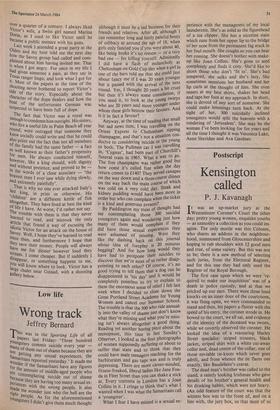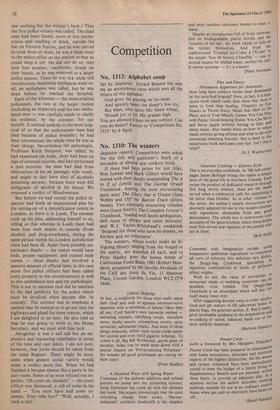Postscript
Kensington called
P. J. Kavanagh It was an up-market jury at the Westminster Coroner's Court the other day; pretty young women, exquisite youths — as unmotley a collection as you could im- agine. The only mottle was this Column, who shares an address in the neighbour- hood, summoned from Gloucestershire and hoping to rub shoulders with 12 good men and true, of some variety. But this was not to be; there is a new method of selecting such juries, from the Electoral Register, and for this one they had only used the Register of the Royal Borough.
The first case upon which we were 're- quired to make our inquisition' was of a death in police custody, and at that we pricked up our ears. There were three loud knocks on an inner door of the courtroom, it was flung open, we were commanded to stand and then, his papers a-flutter with the speed of his entry, the coroner strode in. He bowed to the court, we all sat, and evidence of the identity of the deceased was sworn, while we covertly observed the coroner. He looked the idea of a reassuring Harley Street specialist: striped trousers, black jacket, striped shirt with a white cut-away collar and, dead-centre of the collar, one of those enviable tie-knots which never goes adrift, and from whence the tie flares out exactly, like Baudelaire's cravat.
The dead man's brother was called to the stand, a saintly looking Irishman who gave details of his brother's general health and his drinking habits, which were not heavy. (An odd feature of the court was that the witness box was to the front of, and on a line with, the jury box, so that most of us
saw nothing but the witness's back.) Then the first police witness was called. The dead man had been found, more or less uncon- scious and smelling of drink, outside the bar on Victoria Station, and he was carr;ed (it took three of them, he was a large man) to the police office on the station so that he could sleep it off. He did not do so; they now had another, vociferous, drunk on their hands, so he was removed to a larger police station. There he was sick while still unconscious; breathing appliances were us- ed, an ambulance was called, but he was dead before he reached the hospital.
Each of the witnesses — the three original policemen, the two at the larger station (including an inspector) and the two ambu- lance men — was carefully made to clarify his evidence, by the coroner, for our benefit. It seemed unlikely to the most scep- tical of us that the unfortunate man had died because of police brutality; he had been unconscious the whole time he was in their charge. Nevertheless the pathologist, Professor Keith Simpson, was called; he had examined the body, there had been no sign of external injuries, and had performed a post mortem: the man had died from obstruction of his air passages with vomit, and might in fact have died of alcoholic poisoning anyway, because there were 432 milligrams of alcohol in his blood. We returned a verdict of Misadventure.
But before we had retired the police in- spector had made an impassioned plea for the setting-up of a detoxification centre in London, as there is in Leeds. The coroner took up his plea, addressing himself to us, telling us that whereas in Leeds there had been four such deaths in custody (from alcohol- and drug-overdoses), during the same period within his London jurisdiction there had been 42. Apart from possibly un- necessary deaths — the centre would have beds, proper equipment and trained male nurses — these deaths had involved a massive amount of official time; in this case alone five police officers had been called (very properly in the circumstances) as well as two ambulance men and the pathologist. This is not to mention (nor did he mention it) the bad publicity for the police which must be involved when anyone dies 'in custody'. The coroner was so emphatic it seemed that he wanted us to go out into the highways and plead for these centres, which I am delighted to do here. He also told us that he was going to write to the Home Secretary, and we must wish him luck.
Altogether it was a sad tale but an im- pressive and reassuring experience in terms of the time and care taken. I am not sure, however, that juries should be taken from the same Register. There might be occa- sions when greater social variety would make a verdict more fair. When we had finished it became almost like a party in the jury room. Some of us even refused our ex- penses. 'Oh come on, madam!' — the court officer was dismayed, a roll of notes in his hand — 'You must have had some ex- penses. Your tube fare?"Well, actually, I took a taxi.'











































 Previous page
Previous page